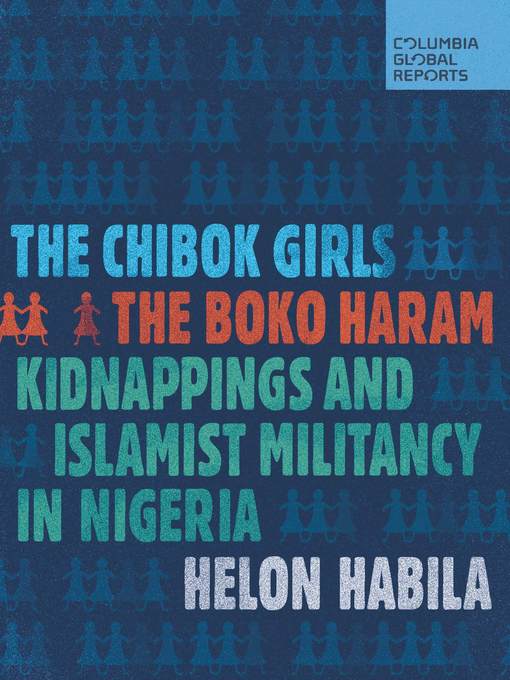
The Chibok Girls
The Boko Haram Kidnappings and Islamist Militancy in Nigeria
کتاب های مرتبط
- اطلاعات
- نقد و بررسی
- دیدگاه کاربران
نقد و بررسی

October 3, 2016
Poet and novelist Habila (Oil on Water) explores the rise of the Nigerian terrorist group Boko Haram and the fallout after their 2014 kidnapping of 276 girls from a government-sponsored school. It is a dispatch from the front lines, as Habila travels to the town of Chibok, where the landscape is riddled with burned tanks and bullet holes, and vigilantes pick up the slack for the inadequate and ineffectual military. He chronicles the founding of Boko Haram, their early clashes with authorities, and their subsequent reign of terror, providing a nuanced window into the psyche of Nigerian Islamic extremism. He also traces the Nigerian government’s history of “political assassinations, palace coups, and electoral thuggery.” In Chibok, Habila meets with a pastor whose two nieces were taken and with the mother of another victim, the latter offering a chilling account of the night of the kidnapping. In nearby Maiduguri, Habila reports on conditions in refugee camps for those displaced by Boko Haram’s attacks. The book culminates in a gripping interview with three girls who escaped. As a native Nigerian, Habila incorporates vital background knowledge on the situation in Chibok and the surrounding area; as a poet, he adds sensitivity and eloquence, capturing the raw emotion of the wounded town.

October 15, 2016
An empathetic inquiry into the circumstances surrounding the 2014 kidnapping of 276 girls from the Chibok Secondary School in Nigeria by the Islamist group Boko Haram.Nigerian-born poet and novelist Habila (Oil on Water, 2010, etc.) seeks to remind the global community of the plight of the kidnapped girls, most still presumed to be held somewhere in Boko Haram's forested strongholds in northern Nigeria or in the terrorist group's bolt-holes in neighboring Niger, Chad, and Cameroon. The author is less interested in assigning blame to former president Goodluck Jonathan's halfhearted counterterrorism efforts or the international community's short attention span than in detailing the complex fault lines that perpetuate Boko Haram's brutal insurgency. After at least two centuries of ethnic and religious conflict, Habila writes that most Nigerians--especially in the north--are "always Muslim or Christian first, ethnic affiliation second, and Nigerian third." The author briefly traces the history of these conflicts but leaves a more thorough accounting in the hands of historians. While Habila's purpose is essentially journalistic, he does not shy away from heartbreaking literary asides. He writes of visiting Chibok years after the girls were taken: "it was like going to Hamelin and feeling the weight of the absent boys taken by the Pied Piper." Habila also identifies long-running themes, tying Boko Haram's kidnappings back to the Sokoto Caliphate, a 19th-century political entity established through jihad and economically sustained by enslaved Christians from Nigeria's "Middle Belt." According to the author, when Boko Haram's leader, Abubakar Shekau, announced in a propaganda video, "I took your girls. I will turn your girls into slaves," their parents, "descendants of the Middle Belt 'pagans, ' understood exactly what he was saying." Both an informative primer on Nigeria's history of Islamist conflict and a passionate testimonial on behalf of the 218 Chibok girls still missing.
COPYRIGHT(2016) Kirkus Reviews, ALL RIGHTS RESERVED.

December 1, 2016
Nigerian novelist and poet Habila (creative writing, George Mason Univ.; Waiting for an Angel) returned to northeastern Nigeria to follow up on and rekindle interest in the story that all-too-briefly caught the world's attention in 2014: the kidnapping of 276 schoolgirls by the radical Islamist terrorist group Boko Haram. Habila demonstrates how groups in Nigeria's "Middle Belt" were never treated as or came to consider themselves part of a Nigerian nation. In this brief book, he introduces readers to individuals struggling to live where slavery under Hausa-Fulani Muslim rule was little altered during British colonialism and only superficially changed under a half century of independent Nigerian kleptocracy and more recent state-imposed sharia law. Habila encounters government soldiers lazing at checkpoints, women waiting in line for food distribution in ravaged villages, and teachers of the lost girls who come alive in his description. This entry would have been improved with the addition of a detailed topographic map, but the Further Reading section includes a number of titles and Internet sources that provide more information about Boko Haram territory. VERDICT Of great interest to readers who have not forgotten #BRINGBACKOURGIRLS.--Joel Neuberg, Santa Rosa Junior Coll. Lib., CA
Copyright 2016 Library Journal, LLC Used with permission.

























دیدگاه کاربران